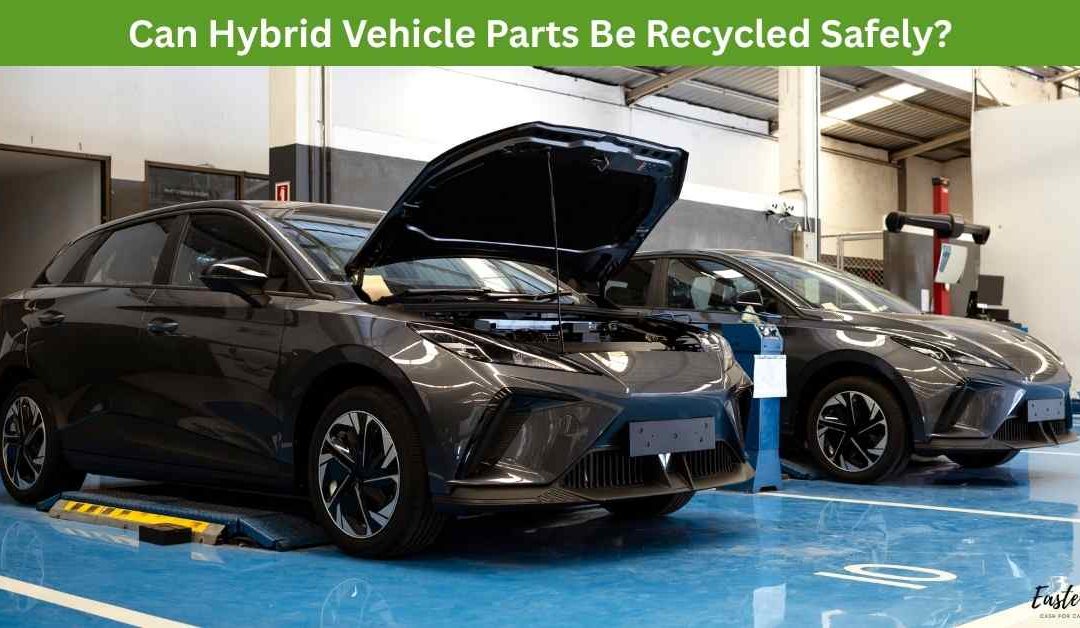As more Australians make the switch to hybrid cars, one important question often comes up — what happens to these vehicles when they reach the end of their life? Are their parts, especially the batteries, recyclable and safe for the environment?
The short answer is yes — hybrid vehicle parts can be recycled safely. However, it’s a bit more complex than recycling a regular petrol car. Hybrids have a mix of traditional mechanical components and advanced electrical systems, which means recycling them requires the right processes and expertise.
Let’s break it down in detail.
What Makes Hybrid Cars Different?
Hybrid cars combine a petrol engine with an electric motor and a high-voltage battery. This setup helps reduce fuel use and emissions, making hybrids more eco-friendly than conventional cars.
However, this also means that when it’s time to recycle or dispose of a hybrid, there are more components to handle — and some of them need special care.
A typical hybrid contains:
- Internal combustion engine parts (similar to petrol cars)
- Electric motor and generator
- High-voltage lithium-ion or nickel-metal hydride battery pack
- Complex wiring and control systems
- Electronic modules and sensors
Each of these parts can be recycled, but not in the same way.
Which Hybrid Parts Can Be Recycled?
- Metal Components
Just like traditional cars, hybrid vehicles contain a large amount of recyclable metal. This includes steel, aluminium, and copper, which can be melted down and reused to make new vehicles, appliances, or construction materials.
Auto recyclers and wreckers routinely remove and process these metals. So from a structural perspective, recycling a hybrid’s body and chassis is quite similar to recycling a regular car.
- Engines and Mechanical Parts
Hybrid engines are smaller and more efficient but still contain many recyclable components — such as radiators, exhausts, alternators, and transmissions. These parts are often refurbished, resold, or dismantled for scrap metal.
- Electric Motors and Wiring
Electric motors and cables are full of valuable copper and rare earth materials. Specialist recyclers extract these metals and reuse them in new electric components, reducing the need for mining new materials.
- Plastic and Glass
Interior panels, bumpers, dashboards, and windows can be separated and processed for recycling. In Australia, many car recycling facilities already have systems in place to manage these materials safely.
What About the Battery?
The hybrid battery pack is the trickiest part — and the one people worry about most. These batteries are made from materials like lithium, nickel, cobalt, and manganese, which are both valuable and potentially hazardous if not handled correctly.
Can Hybrid Batteries Be Recycled?
Yes, but only by certified recyclers. These professionals have the equipment to safely disassemble and process high-voltage batteries. The materials inside are recovered, refined, and reused to make new batteries or other products.
Many major car manufacturers now run take-back programs for hybrid and electric batteries. Toyota, Honda, and Lexus, for example, partner with certified recycling facilities to ensure used batteries are collected and processed safely.
How Battery Recycling Works
Here’s a simplified breakdown of the process:
- Collection and transport – Batteries are removed and transported in special containers.
- Disassembly – The outer casing and electrical modules are carefully separated.
- Material recovery – Metals like lithium, nickel, and cobalt are extracted through mechanical and chemical processes.
- Reuse and repurposing – Recovered materials go into new batteries, while some battery cells are reused in energy storage systems.
This process helps reduce mining demand, conserves resources, and prevents toxic materials from ending up in landfill.
Are There Environmental or Safety Risks?
When done correctly, hybrid recycling is safe — but improper handling can be dangerous. High-voltage batteries can cause electric shocks, fires, or chemical leaks if dismantled without proper equipment or training.
That’s why recycling hybrid cars should always be handled by licensed auto recyclers or car removal experts who follow strict environmental and safety standards.
In Australia, most professional car recycling and wrecking companies are equipped to manage hybrids responsibly. They follow environmental regulations and ensure all fluids, batteries, and parts are disposed of or repurposed safely.
How Car Removal Services Help
If you have an old hybrid car that’s no longer running or is too expensive to repair, professional cash for cars or car removal companies can help.
Here’s how they make recycling hybrids safer and easier:
- Free car removal – They’ll collect your vehicle directly from your property.
- Eco-friendly recycling – All parts, including batteries and fluids, are processed using approved methods.
- Instant cash payment – You get paid on the spot for your unwanted hybrid, even if it’s damaged or not running.
- No hassle – You don’t need to worry about dismantling or finding recyclers yourself.
Companies like ours specialise in handling all types of vehicles — including hybrid and electric cars — in a way that’s both environmentally responsible and convenient for you.
The Future of Hybrid Recycling
The recycling technology for hybrid and electric cars is advancing rapidly. Manufacturers are working closely with recyclers to create closed-loop systems, where nearly every part of a vehicle can be reused or repurposed.
As demand for hybrid vehicles continues to grow, Australia is also expanding its network of battery recycling facilities and metal recovery plants, ensuring that hybrid recycling remains safe and sustainable.
Soon, the materials from your old hybrid might even be powering the next generation of eco-friendly cars.
Recycling hybrid vehicles safely isn’t just possible — it’s already happening every day. With proper systems and experts in place, these cars can be broken down responsibly, their materials reused, and their environmental impact kept low.
So if your hybrid has reached the end of its road, you don’t have to worry about waste or pollution. Selling it to a trusted cash for cars service ensures it’s handled the right way — safely, sustainably, and with respect for the planet.
If you are in Ringwood, and looking to sell your car or get cash for trucks, below is the best way to visit us.
Eastern Cash For Cars
720 High St Rd, Glen Waverley, VIC 3150
(03) 7035 7830
www.easterncashforcars.com.au


Recent Comments